Lessons from a Decades-Long Project
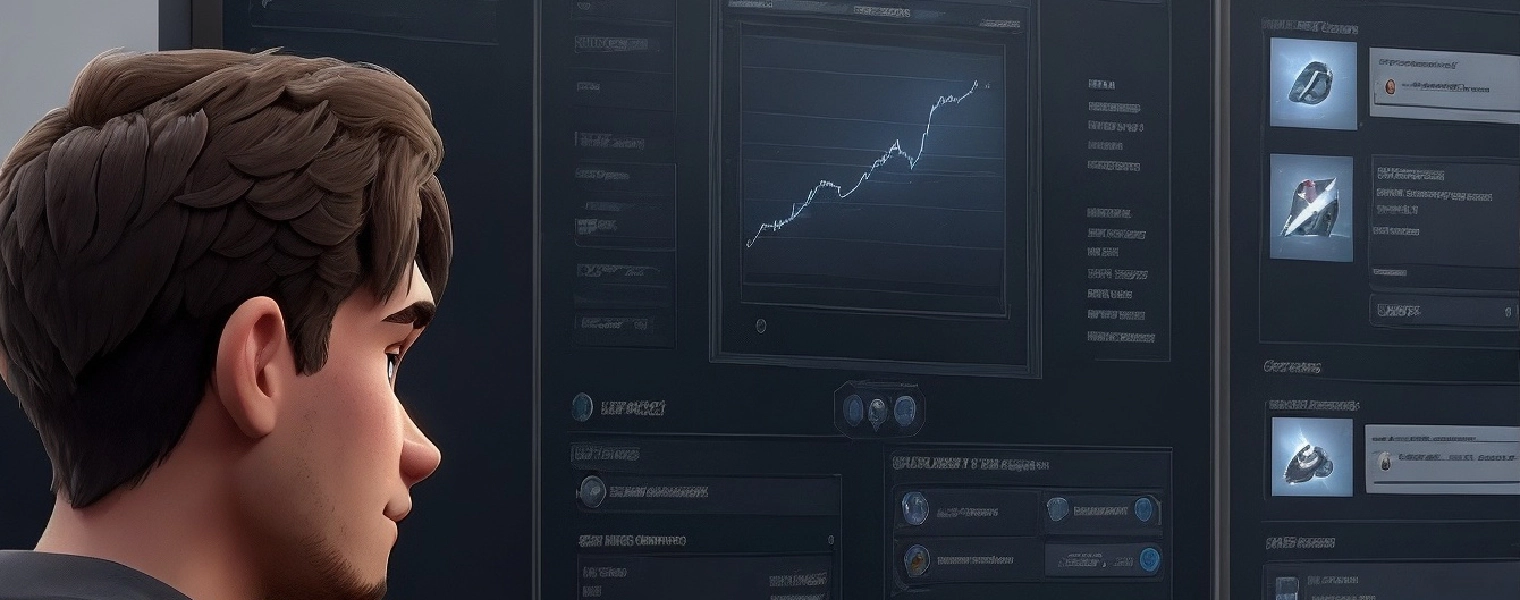
I wrote Evepraisal. Evepraisal is a tool/website that began as a way to more efficiently blow up transport ships in Eve Online and evolved into a trusted pricing estimate authority for the entire (Eve Online) Universe. This article will cover the technical lessons and experiences that I had maintaining this extremely useful tool for a decade.
Getting Started
I have already told the story of how it started in my Economists with Guns article, but I did want to add that the first version of what became Evepraisal was written in Python and used a static database of pricing data. It also only worked for cargo scan results because it was used for the Burn Jita event in 2012 where players in cheap ships would attack transport ships carrying expensive goods in high-security space knowing that the police would quickly show up and destroy the attackers. I made this tool to help identify which ships were holding expensive goods. The first version had all of the major features: a box you can paste some text into, a listing of all the items and a total price estimate on the top of the page. After using it for a little bit I realized that people didn’t believe my estimates when I just posted them in the scouting chat… So I worked on a way to share the results in the chat with a link, which, I believe, is most of the reason for the success of the website.
After that, life went on. I kind of forgot about the tool. I only intended it to be used for this event so the prices of items never updated. They were all frozen in time. It was a few months later when I noticed that the tool was still being used a good amount and I started getting requests for updated prices and support for other formats. I bought the evepraisal.com domain and started my work.
v1: Getting real with Python
The next version was written in Python and used an API to fetch market data from eve-marketdata.com, which is now sadly no longer running. Also, the mapping of the item name to the so-called “type ID” was done by harvesting the list of all types and type IDs from data files that come along with installing the Eve Online client. These files were SQLite databases that could be easily opened and queried. Thankfully, someone else has already done the reverse engineering work and published a Python library to help with querying this data.
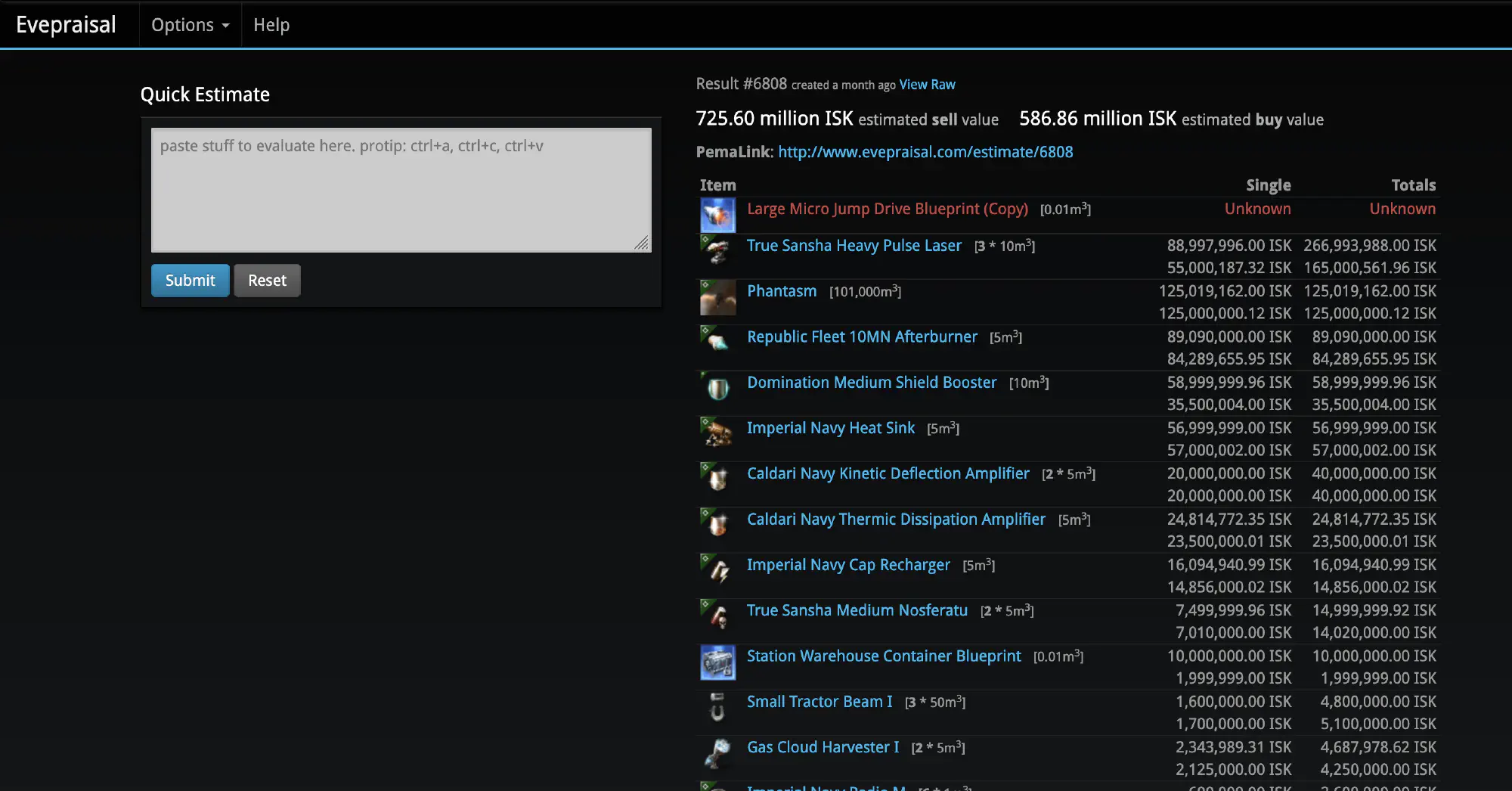
I used PostgreSQL for the database and memcached to cache both appraisal pages and requests to eve-marketdata.com. To get an idea of what the data looks like, here are the tables that this version ended up with.
Appraisals
Id INTEGER
Kind TEXT
RawInput TEXT
Parsed JSON
ParsedVersion INT
Prices JSON
BadLines JSON
Market INTEGER
Created INTEGER
Public BOOL
UserId INTEGER
If you’re wondering where the “type” information is, well… it’s in a giant JSON file that is loaded into memory on startup. If you want to see the last version of this file, it exists here.
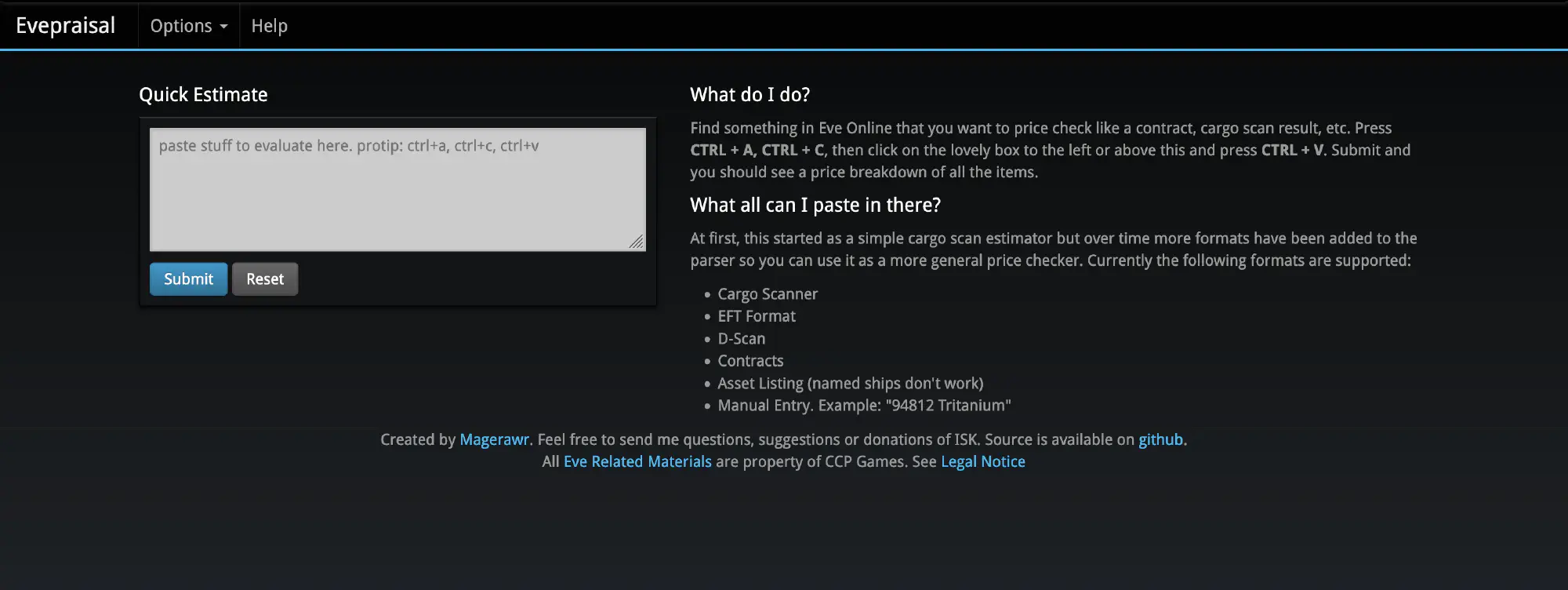
This first version was great but it wasn’t perfect. A lot of memory and disk space was being used for the database. The database needed a good amount of maintenance. After a few years, a lot of these things made the website run fairly slow and I had too many outages for my liking, so I needed to do something to help the situation…
v2: Just Rewrite it in Go
To address some of the issues with v1 I decided to rewrite the project in Go. I wanted to experience writing something “real” in the language so this was it. This effort involved re-writing all of the parsers, all the API handlers, the frontend, and… everything into Go which took a good deal of effort. But in the end it was worth it. The memory usage was WAY down for several reasons, the CPU usage (which was starting to be a problem too) was very minimal and the website was extremely fast. Rewriting the website in a different language wasn’t the only thing that changed though. I changed the database, caching method, how it sourced data, and probably a lot more. All while maintaining a familiar user experience.
PostgreSQL to Bolt
With this rewrite, I also switched from PostgreSQL to an embedded key/value store called Bolt. This means that the only way I have to access data is by the exact primary key or by scanning a range of keys in alphanumeric order. This made some things more difficult but it also taught me a lot about this type of database and it’s fast. Extremely fast. I would post the schema here, but that’s not a thing for Bolt. So instead, I will show you the buckets and the format I used for keys and values for each bucket.
bucket=appraisals
key_format="AppraisalID"
value=JSON Encoded Appraisal Data
bucket=appraisals-last-used
key_format="AppraisalID"
value=timestamp encoded as a uint64
bucket=appraisals-by-user
key_format="CharacterOwnerHash:AppraisalID"
value=AppraisalID
bucket=stats
key=total_appraisals
value=uint64
Creating an appraisal would involve adding an entry to appraisals, appraisals-last-used, appraisals-by-user (if the user was logged in) and stats buckets. Deleting is pretty much the same. It took a while to get these features worked out but once it was done I haven’t needed to adjust this very much at all.
Eve-Marketdata to ESI
I moved from eve-marketdata.com to ESI, which newly supported fetching live(ish) market orders and allowed Evepraisal to have more reliable pricing. ESI also guesses the market price which was a useful value to fall back on but sometimes it was ridiculously out of whack with the market.
Other Changes
Around this time I also fixed some usability issues. I tackled pricing for items that had a super low volume or couldn’t be sold on the market by summing up the cost of the components that were needed to build that item. I added a percentage upcharge to that to factor in for build time and effort. In the end, it made for a decent price after some tweaking.
In addition to re-implementing the existing parsers in Go, I also added support for a few more formats and improved on the “heuristic” parser that would try VERY HARD to find Eve Online types from the input.
The data migration was fairly extensive. I had a process that would re-parse every appraisal again to ensure that it could. I noted differences and eventually decided that it was good enough (or better enough) to do a final migration and flip over to the new site. Because this process was pretty slow I also optimized the parsers a bit at this time so this would go faster. I tested enough to ensure that when the day came that I swapped the website over to the new version most users didn’t notice. I made some UI adjustments, which people did notice, but the fact that the entire thing was rewritten was unseen to most users.
Data Flow
So let’s put all of this together. Here’s the basic dataflow diagram for Evepraisal:
flowchart TD
esi["ESI\nEvery 6 minutes"]
pricedb[Prices DB]
static-data-export["Static Data Export\nEvery 6 hours"]
typedb[Types DB]
parser[Parser]
pasted-text["Posted Appraisal Text\nFrom a user"]
appraisal[Appraisal Logic]
appraisaldb[Appraisal DB]
appraisal-page[Render and return appraisal page]
esi --> pricedb
static-data-export --> typedb
typedb --> parser
pasted-text --> parser
parser --> appraisal
pricedb --> appraisal
appraisal --> appraisaldb
appraisaldb --> appraisal-page
And here’s what the new version looked like: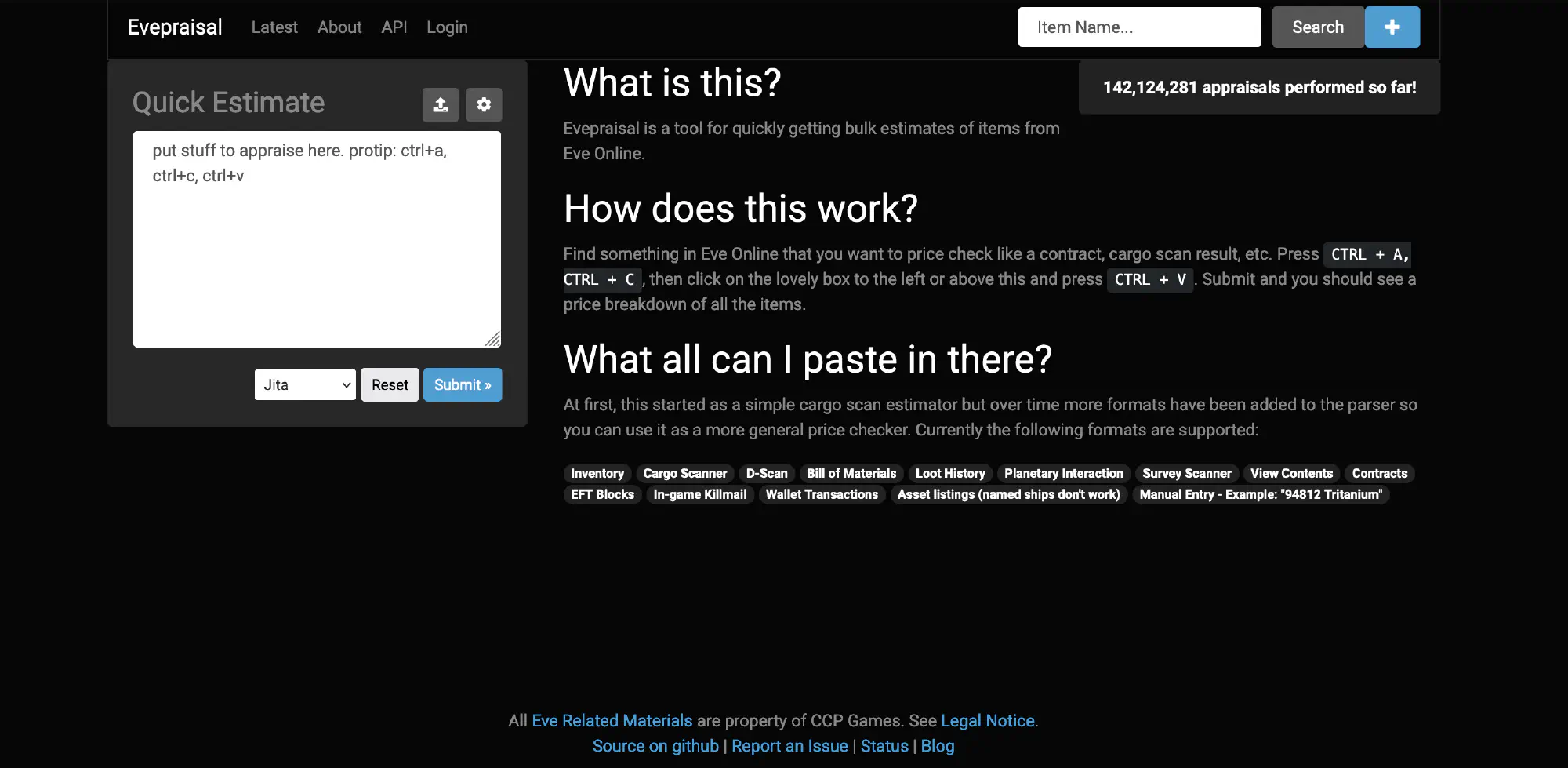
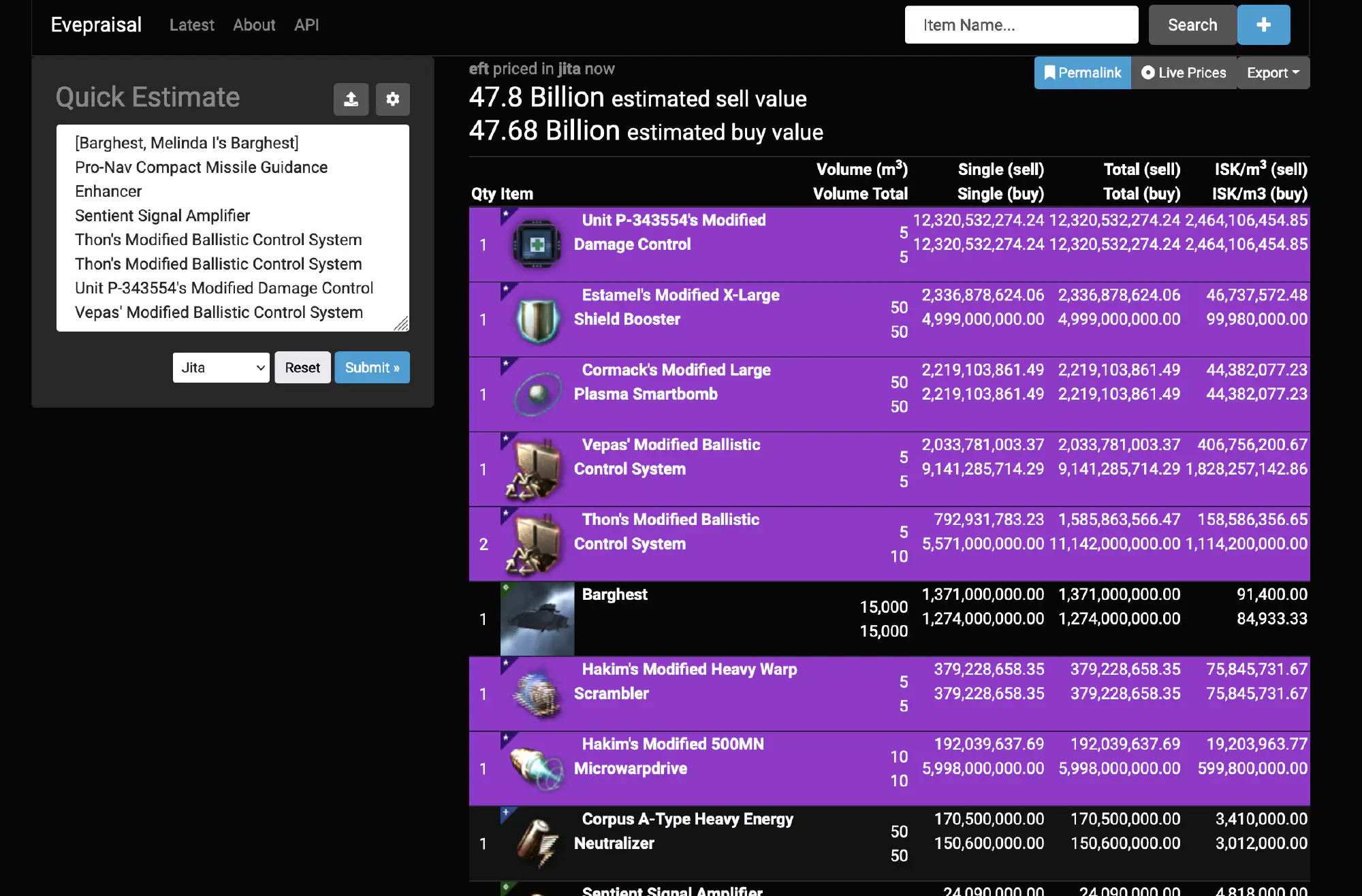
All-in-all, I think this rewrite went well. It probably took more effort than I expected, but it paid off over the next 6 years from 2017 to a couple of weeks ago. My primary goal was to get a functioning knowledge of operating a project using the Go programming language, and that happened.
Project Recap
So now that I described the evolution of the project and the two major versions, let’s recap some major issues and non-issues that I had while maintaining the project.
What went wrong
I encountered hurdles such as unreliable game data, naming inconsistencies, missing data, and disk constraints. Overcoming these challenges shaped how I approach these problems in my other work.
Unreliable game data
When CCP standardized the names of modules, they never bothered to update the type database with the new names. Also, volumes and packaged volumes are not consistent and not in the game data, so I had to maintain my mapping, which sucked.
Eve-marketdata had a good number of outages and eventually just stopped working for a long period. So to get the website back up I quickly made a few integrations with other services (who I think had less reliable data).
CPU/Memory/Disk Constraints
I already mentioned CPU/memory constraints in the motivations to re-write the project using Go. However, v2 still had issues with disk space. Because appraisals were never deleted I was slowly running low on disk space. I ended up fixing this in two ways:
- changing the default for the API to not store appraisals
- purging data more aggressively by using the “last seen” time to decide which appraisals are unlikely to be looked at again
What didn’t go wrong
Certain aspects, like deployment, OS upgrades, and backup/restore, flowed smoothly. Rigorous testing and proactive data management bolstered overall stability.
Deployment
You may be surprised to see my deployment script. You can read it in the deploy.sh file. It simply copies up a systemd unit file and the Go binary. Then it ensures that the service is enabled. That’s basically it. It’s incredible that the deployment only involves updating a single binary file.
OS Upgrades and Migrations
Throughout the past decade, there were instances of image upgrades and migrations. Thankfully, these processes transpired without major issues, resulting in only a few minutes of downtime once or twice a year. In the cloud environment, periodic migrations were required to address security vulnerabilities. Notably, cloud providers have improved their strategies, making migrations to new VM host more seamless. An example of a migration that wasn’t seamless occurred when the VM hosting Evepraisal was moved to a different data center, requiring some downtime of approximately an hour or two.
Backup/restore
I never had to restore from backup… and, to be honest, it’s not the worst thing in the world that the database gets wiped. Sure, it would be annoying to users that have links to their appraisals but a lot of them can be recreated pretty easily.
Testing
There’s a lot of table-based testing in this project, which allowed me to add new test cases without needing to write a lot of code. This is especially useful in the parser part of the app. Here’s an example of a couple of test cases for the “listing” parser, which handles lines that simply have a quantity and an item name delimited by some kind of whitespace:
{
"quantities with a decimal, for some reason",
`123.12 Griffin
456.3 Maulus`,
&Listing{
Items: []ListingItem{
{Name: "Griffin", Quantity: 123},
{Name: "Maulus", Quantity: 456},
},
lines: []int{0, 1},
},
Input{},
false,
}, {
"with ending whitespace",
`Compressed Iridescent Gneiss x 109 `,
&Listing{
Items: []ListingItem{
{Name: "Compressed Iridescent Gneiss", Quantity: 109},
},
lines: []int{0},
},
Input{},
false,
}, {
"with beginning whitespace",
`1865 Compressed Glossy Scordite
105 Compressed Brilliant Gneiss
27 Compressed Jet Ochre`,
&Listing{
Items: []ListingItem{
{Name: "Compressed Brilliant Gneiss", Quantity: 105},
{Name: "Compressed Glossy Scordite", Quantity: 1865},
{Name: "Compressed Jet Ochre", Quantity: 27},
},
lines: []int{0, 1, 2},
},
Input{},
false,
}
All of the test cases for all parsers were run by the same code, so adding more tests is just adding a new Case object. Whenever I fixed a reported bug I would create a new test case so that the same bug couldn’t happen again. This has prevented an incredible number of potential regressions over the years.
Stats for nerds
| Metric | Refs | |
|---|---|---|
| Apprisals Performed | 150 Million | |
| First Commit | Dec 17, 2012 | 3a24930 |
| Last Commit (Python Version) | Nov 27, 2017 | bb949e2 |
| First Commit (Go Version) | Apr 25, 2017 | 55f6794 |
| Lines of code (Python) | 1283+1051=2334 | python-evepraisal + eve-paste |
| Lines of code (Go) | 8022 | go-evepraisal |
| Number of Commits | 450+234+130=814 | go-evepraisal + python-evepraisal + eve-paste |
| Total Number of Users | 3,162,712 | Google Analytics (private) |
| Total Number of Browser Sessions | 25,251,120 | Google Analytics (private) |
| Peak Active Users (single day) | 11,485 | Google Analytics (private) |
| Top Countries | United States, Russia, United Kingdom, Germany, Canada | Google Analytics (private) |
| Gender Breakdown | 93.48% Male, 6.52% Female | Google Analytics (private) |
| Browser Breakdown | 69.31% Chrome, 13.98% Firefox, 6.28% Edge | Google Analytics (private) |
Note that this doesn’t cover API access to Evepraisal, so a lot of those usage metrics aren’t captured here.
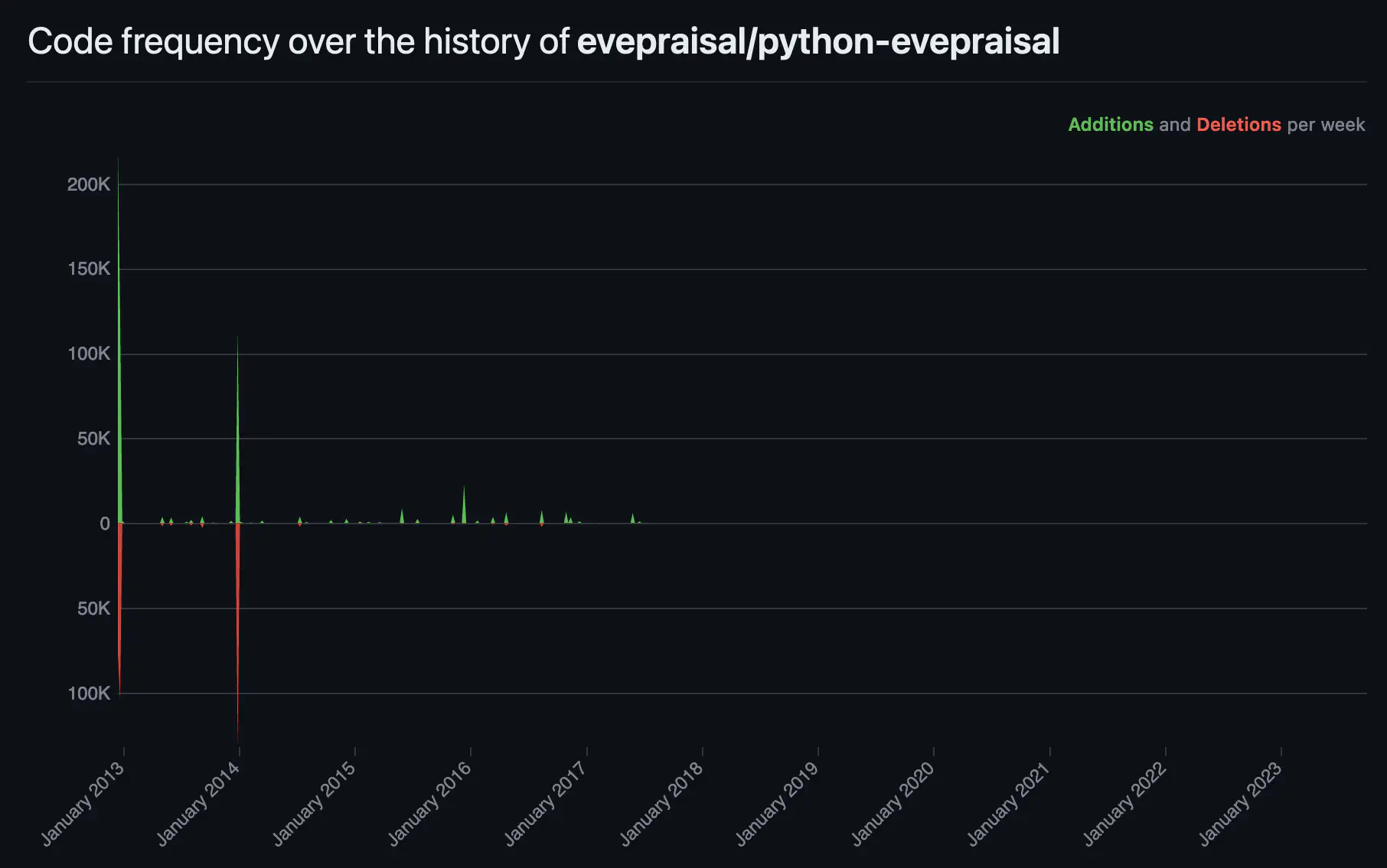
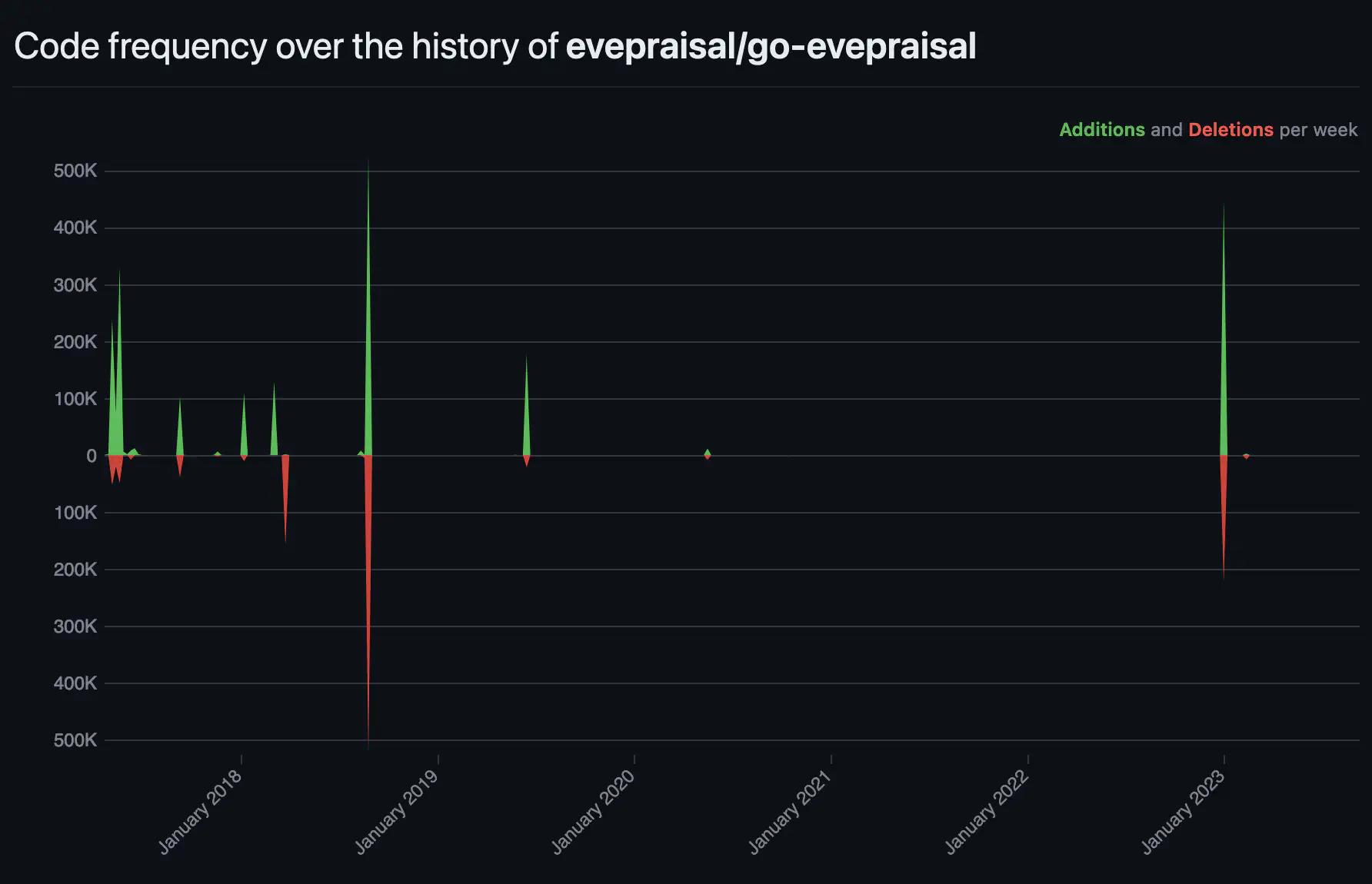
Advice
Now here’s some advice for running a similar project. I feel like most of this applies to many kinds of side-projects that you intend to have people use.
Identify data dependencies and find good sources
Evepraisal suffered a lot whenever the source of data wasn’t reliable. Eve-marketdata served as the data source for market data for Evepraisal for a long time. I ended up integrating with a similar service as a backup before settling on using CCP’s ESI market API to fetch market data from the original source.
It’s a similar story with the type database, first, it was gathered using dubious methods that could break often until it was replaced with a more official and reliable data source.
Automate the rotation of data dependencies
I initially had a script that would scrape Eve Online’s type data from the game client data files. This was super manual and it involved me updating the game (which took a lot of my disk storage for a game I didn’t play much), running a script, and checking in the new giant JSON file with all of the types in it. The process was “fine” but it was very reactionary. I had to do this for every major game release and that’s pretty often. I would normally get messaged about the game data needing an update from a user noticing a new item didn’t get recognized. That’s kind of embarrassing, so I needed to improve this.
I was so happy when CCP started regularly releasing the Static Data Export (SDE) for Eve Online. It had (almost) everything I needed. After this change, Evepraisal would periodically check for a new SDE release and, if there was one, would download the new package, process it, make a new type database and switch to using the new one. It was pretty slick once I got this process working reliably.
You may notice a pattern here: moving from scrappy 3rd party APIs that are maintained by individuals to using first-party data sources like SDE and the ESI API. I think CCP did a lot of good work to make it reasonable to create tools like this without a lot of effort.
Have a backup/restore plan
I, luckily, never really had an issue with backup and restore, but I do think you need some kind of plan. Users may forgive you if you lose a day’s worth of data but they’ll be pretty irritated if you lose all of it… So have a backup. And test the restore process every once in a while. My backup strategy changed a good amount for Evepraisal. I initially took SQL dumps and put them into my Google Drive using a script. However, after switching to Bolt for the database I had to come up with a different strategy. I used a combination of image-level backups along with a script that could export recent appraisals to Google Drive. Later on, I relied solely on the VM image backups.
Cleanup stale data automatically
After you’ve gotten the project to a stable state the things that will break are the log files that are never truncated or database tables that grow forever. Come up with a strategy to deal with this. I let systemd manage log files for me. By default, systemd will keep 4GB of log files for you, which was enough for me. I had a subprocess in the Evepraisal server that would clean up old appraisals automatically.
Get alerts
You need alerts, especially if your interest in the project varies over time. You may have an issue for days before someone tries to tell you so you should be proactive.
- Log-based alerting
- I used Papertrail’s free plan to handle logging and alerting for me. I filtered a lot of irrelevant things from the log so Papertrail would only receive actionable logs.
- Uptime monitoring alerts
- There are a lot of free services for this but I used Uptime Robot.
- Google Alerts
- Hopefully, the name of your service is unique enough that you can make a Google alert for the name. It will show Reddit threads, blog articles, forum posts, etc. that mention this name. It’s great, but it can also be a little slow.
- Subscribe to email lists that will tell you if major changes are happening with the APIs that you’re using.
- Be available on a social platform like Mastodon and list your handle on the website. If people are using your website someone will find your user and tell you if something is wrong if it’s broken for long enough.
Monetization
I used Google AdSense to generate revenue from Evepraisal. This revenue completely covered operational costs but it didn’t make too much beyond that. The only ongoing costs for this project were hosting and domain name registration. Monetization ensured that the project lived for as long as it did.
If I were to change things…
You should keep a log and make an entry for every time your attention is required, you can use that log to figure out what to focus on the next time you feel like working on the project.
I’ve always wanted to do more with the tool but life always got in the way. There are so many cool ways to show and process this kind of data. At various times I saw orders that made no sense pop up; orders that I don’t think were just margin scans. There would be sell-orders way below market value. Buy orders way above market value. It just made no sense to me because it would happen with high-volume items that had a fairly fixed market price. It didn’t happen super often, but you might be able to make some money off of those… as long as it isn’t an obvious scam.
Other than that… I don’t know. I think this was a massively successful project. I’m extremely proud to have contributed something so significant to the game.
gf in local
This all started from wanting the Burn Jita event to be more streamlined. I saw how chaotic it was when identifying targets and I felt like having a tool to quickly guess the value of the target was very much needed. By the time the next Burn Jita event came around Evepraisal’s usage was incredible. Once the event concluded, I came across a post listing all the killmails (records of ships being destroyed) associated with the event. I wrote a script to identify cargo scan appraisals containing items that match those found in the hull of the ships for each of the killmails. I ensured these appraisals were generated before the corresponding kills, suggesting that Evepraisal played a role in these victories. To my immense satisfaction, this script successfully pinpointed every single kill on the list-a truly gratifying accomplishment and a testament to how critical my project has become to the game.
In conclusion, Evepraisal’s journey underscores the importance of data reliability, automation, strong testing techniques, and monetization. I thank everyone who has used the tool in their everyday space lives. You kept me going for so long. See this post to see more about the reasoning behind shutting the website down.
o7
📝: Lessons from a Decades-Long Project #eve-online #gaming #evepraisal #golang #python #postgresql https://sudorandom.dev/posts/lessons-from-a-decades-long-project/